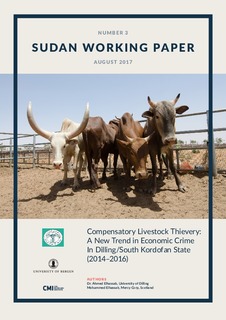Compensatory Livestock Thievery: A New Trend in Economic Crime In Dilling/South Kordofan State (2014–2016)
Working paper
Permanent lenke
http://hdl.handle.net/11250/2475401Utgivelsesdato
2017-08-01Metadata
Vis full innførselSamlinger
- Publications [1488]
Originalversjon
Bergen: Chr. Michelsen Institute (Sudan Working Paper no. SWP 2017:3) 28 p.Sammendrag
“Compensatory livestock thievery” within the greater Dilling locality in South Kordofan State (SKS) is an economic crime that was born out of a war environment. In this form of crime, thieves steal animals, particularly cows, not for purposes of expropriation, but rather to return them to the owner for a fixed sum of money, what may be defined as “greed monetary compensation.” The phenomenon is driven by many factors, such as high rate of unemployment, poverty, financial difficulties among the youth, but is importantly linked to the recent history of war in the area and its consequences, such as proliferation of weapons and the collapse of social order. This new trend in crime has shaped the post-war socioeconomic transformation in greater Dilling. Motivated by observing socioeconomic dynamics in post-war areas, this study tries to investigate and trace the root causes and main drivers of this new type of economic crime. The main question of the study is whether compensatory livestock thievery is simply a variation of an old crime, or a new trend influenced by war and other socioeconomic factors. In a survey of those involved in the activity itself, most of the questions concentrated on the nature of the crime, its root causes, the way in which it happens, its outcomes, the parties involved, and the role of the government in the process.
The authors are indebted to Professor Leif Manger for reading this paper and for suggestions he made to improve on the paper's structure
